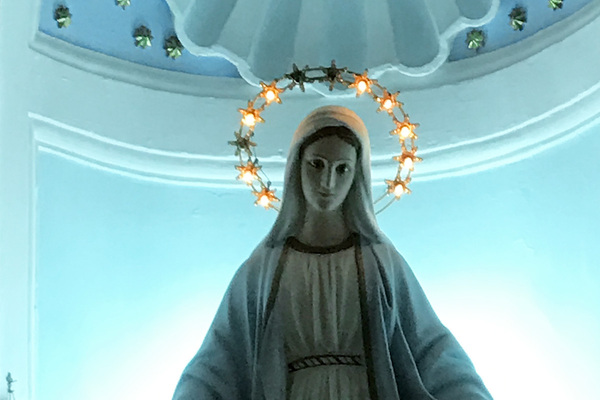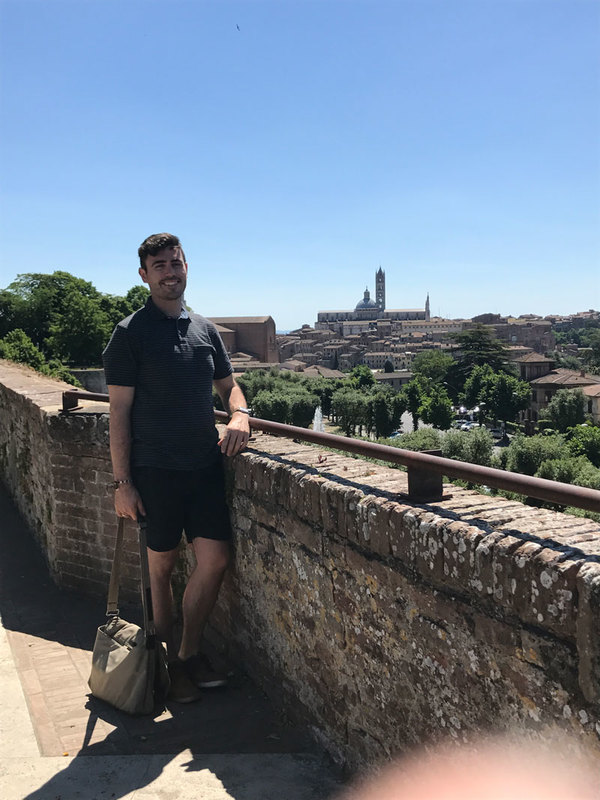
Master of Divinity student, Michael Rossetti, recently returned from Siena, Italy where he served the elderly and disabled, and grew in his Italian conversational skills as well. He recently wrote to us about his experience on La dolce vita è una vita di misericordia (or the sweet life is a life of mercy).
When choosing to continue my studies in Italian, my goal was ensure that my time in Italy was not spent as the American who goes there to strictly have experiences of the typical “dolce vita” things, like marveling at a basilica in a piazza while slowly savoring gelato; giving back and doing service during my stay was major factor in my decision making. When I contacted my current school, Dante Alighieri Siena, and they informed me that the casa della misericordia offers ministries of presence to students, I knew this would be an organization that is in alignment with my values, the ministries I practice at Notre Dame, and a service I could do based on my level of Italian language. Knowing the opportunity was available, I was eager to practice the corporal works of mercy in this way during my time in Siena.
For 11 hours a week, I served as an assistant to drivers and employees at misericordia in their transportation vans. The transportation vans are exactly what they sound like: they serve the purpose of assisting the elderly who are not as mobile or able to drive and people with disabilities, ranging from extreme physical and mental disabilities to less severe developmental ones. My role within the vans was to physically assist the client into the van and ensuring he or she was situated comfortably, and depending on the person, securely. For an elderly person, this ranged from me offering a polite hand of assistance to needing to offer my entire body as support in lifting the client into the van and keeping him or her stable, walking him or her to a seat, and ensuring he or she was safely buckled in. This could be similar for some clients with mental or physical disabilities, but if a client had a wheelchair, I would then utilize an electric lift that would unfold for the client to be wheeled onto, and then lift up him or her to the floor level of the van. I would guide the person in the wheelchair to the area where there were securing utensils that held the wheelchair stable while driving.
After this, I would sit in the area of the van with the clients during the transportation time. Not one of them knew English, so if the person did have the ability to communicate, I would ask basic questions in Italian, and I would ensure that he or she knew I was (and am) by no means fluent in the language. Nonetheless, I was able to offer conversation to some people. With those who could not speak, I simply accompanied them in sitting and in ensuring they remained secure. When we would arrive at the destination, I would assist the person out of the van, and depending, I would either greet family members who were waiting for their loved one or I would help the person into their home and ensure they were situated. When we were in between client pick-ups, I would sit in the front seat next to the driver and assist him or her with anything needed, for instance, looking up the next person for pick up, but this also was a time for me to also be present to the driver, to get his or her take on the service being offered or on current happenings in Italy.
The work that La casa della misericordia does is so important for Siena. Many of the people assisted or the families of client assisted would not be able to do the things they do. For some, misericordia assists the client in feeling and being more independent, not needing to constantly rely on family members or friends to take him or her to something; for other more extreme situations, some families could not afford to have a vehicle large enough to transport the extremely physically and mentally disabled person to where he or she may need to go. Because Siena is a much older town, it’s quite compact and parking space is limited. A lot of people cannot keep a car nearby, let alone one large enough to transport a loved one in a specialized wheelchair. In regards to the elderly, some of them sadly may not have as much family nearby to assist them with these things as they age, so misericordia steps in for this role there. These are just a few scenarios or situations misericordia helps with. Furthermore, many of the services are offered at a low cost or for free, depending on the situation of the person and the reason for needing transportation. Truly, misericordia lives up to its name in how and what it offers to the city of Siena.
I cannot fully express how beautiful it has been to experience and assist at an institution that practices the corporal works of mercy. Every week, I continued to work with the same drivers and with some of the same clients, and getting to know each of them was an honor and a pleasure. To see the situation of some families with a loved one with severe disabilities was incredibly humbling – the people were always incredibly grateful to misericordia for its service and they were always so happy to have their loved one with them again. As a person who has not worked formally with the elderly or those with disabilities, I grew in my understanding of these community’s needs and how a community can assist them and their families with that need. Ultimately, I was able to offer presence, some relief, and a helping hand to the clients and the drivers, and at times, my language mistakes offered a bit of entertainment for others as well.
Practicing the corporal and spiritual works of mercy is a part of my life and work objectives as a theology student, but to have seen how this is practiced and implemented in different ways and for different communities has been nourishing to my own spirit but also informative as to how I hope to practice these works when I return home. For my remaining time at Notre Dame, I will be an AR in Keough Hall, and part of my goals for the dorm is to ensure there are service opportunities offered through the dorm. When I return to South Bend, I would like to research what services the city offers to both these communities who may be in need, and hopefully, I continue practicing the acts of mercy I have learned and done here in Siena with the casa della misericordia, the home of mercy.
